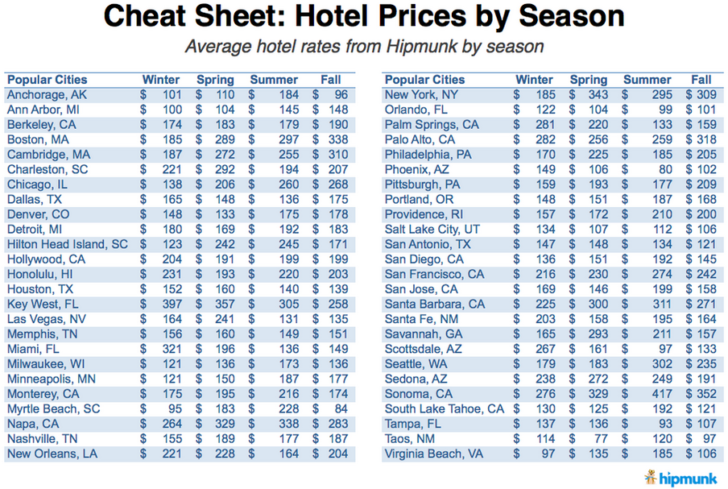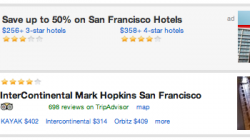Hipmunk recently published a cheat sheet on Twitter that provides the average hotel rate by season for 50 major destinations; a more detailed analysis of hotel prices is on the Hipmunk blog. It gave me the idea that this table could inspire trips to certain places just for the ability to book a few hotel mattress runs. Places like Scottsdale in the summer, Myrtle Beach in the winter, and Seattle in the winter can see average prices fall by half. Combined with a cheap flight, these destinations could even make for an inexpensive off-season vacation.
You may find even better deals by looking at specific hotels, but my point is that the chart could be useful to see which places are even worth checking and which to pass by. The San Francisco Bay Area, for example, sees steady rates year round, although there might still be some variability on a weekly basis as demand from business travelers slacks off on weekends.

Many people are familiar with mileage runs, which involve booking cheap flights over long distances to accrue more frequent flyer miles. They aren’t as common as they used to be due to changes in how many major loyalty programs operate, including the addition of minimum revenue components to earn elite status and more restrictive routing rules.
Hotel loyalty programs haven’t seen such changes. They’ve always been revenue based, awarding points based on the dollars you spend, and so the concept of booking cheap stays for points may seem odd. Aren’t low rates going to make that more difficult? Yes and no.
Mattress runs generally make sense only if you plan to achieve elite status, which is critical to earning the bonus points that make them worthwhile. Many programs offer 500-1,000 bonus points at check-in, so hopping around and booking one-night stays can easily double or triple your points on a cheap rate. They may offer 15-50% more points on every dollar based on your elite tier. A closed lounge on weekends can mean more bonus points as an apology. Finally, quarterly promotions can sometimes add a few hundred (or a few thousand) points to every stay.
In the long run, you may find that status can save money on resort fees, breakfast, and upgrades even if only 20% of your stays are actual vacations and the other 80% are mattress runs. Breakfast at some resort hotels, with few other options in the area, may be $30-50 per person and can quickly add up to significant savings — assuming you would have purchased it anyway. But if your vacations take you to small towns or budget brands where rates are always cheap, the opportunity for an upgrade is slim, and a free bagel is all you need in the morning, then I say take a pass.


